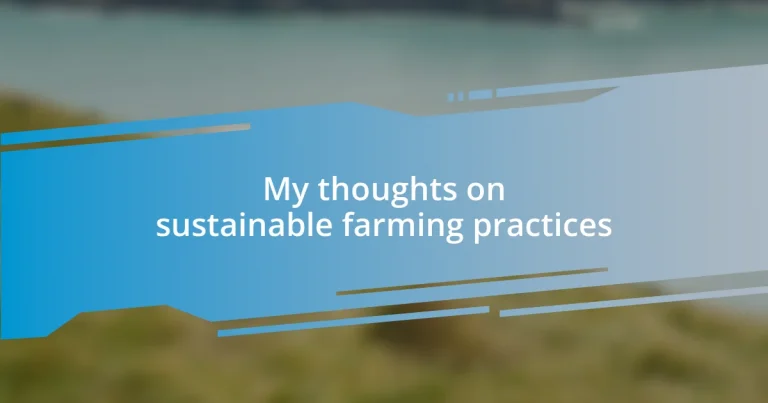Key takeaways:
- Sustainable farming enhances agricultural productivity while protecting the environment through practices like crop rotation and biodiversity promotion.
- Innovative techniques such as vertical farming, biochar usage, and aquaponics demonstrate how technology can support sustainability and efficiency in agriculture.
- Engaging with local food systems fosters community connections, supports local economies, and encourages consumers to choose healthier, locally-sourced food options.
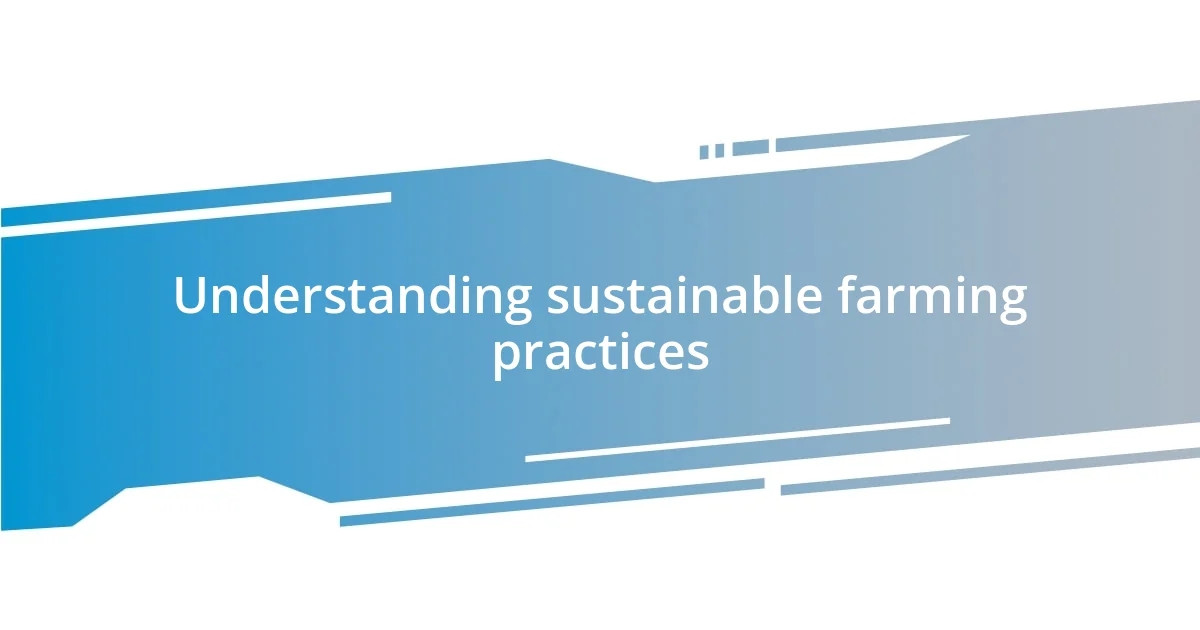
Understanding sustainable farming practices
Sustainable farming practices focus on optimizing agricultural productivity while protecting the environment. For me, visiting a local organic farm was an eye-opener. I remember walking through the rows of vibrant vegetables, realizing that farming doesn’t have to come at the expense of nature—it can actually support it.
One key aspect of sustainable farming is the use of crop rotations, which I’ve witnessed firsthand on a family member’s farm. By alternating the types of crops grown in a particular area, they not only replenish soil nutrients but also combat pests naturally. Isn’t it fascinating how nature has its own way of maintaining balance if we just allow it?
Moreover, sustainable farming prioritizes biodiversity, which can enhance resilience in the ecosystem. When I think back to my own garden, planting a variety of flowers, herbs, and vegetables drew in bees and butterflies, turning it into a thriving little ecosystem. Doesn’t it make you wonder how our choices in agriculture can ripple through the environment and impact our health, as well?
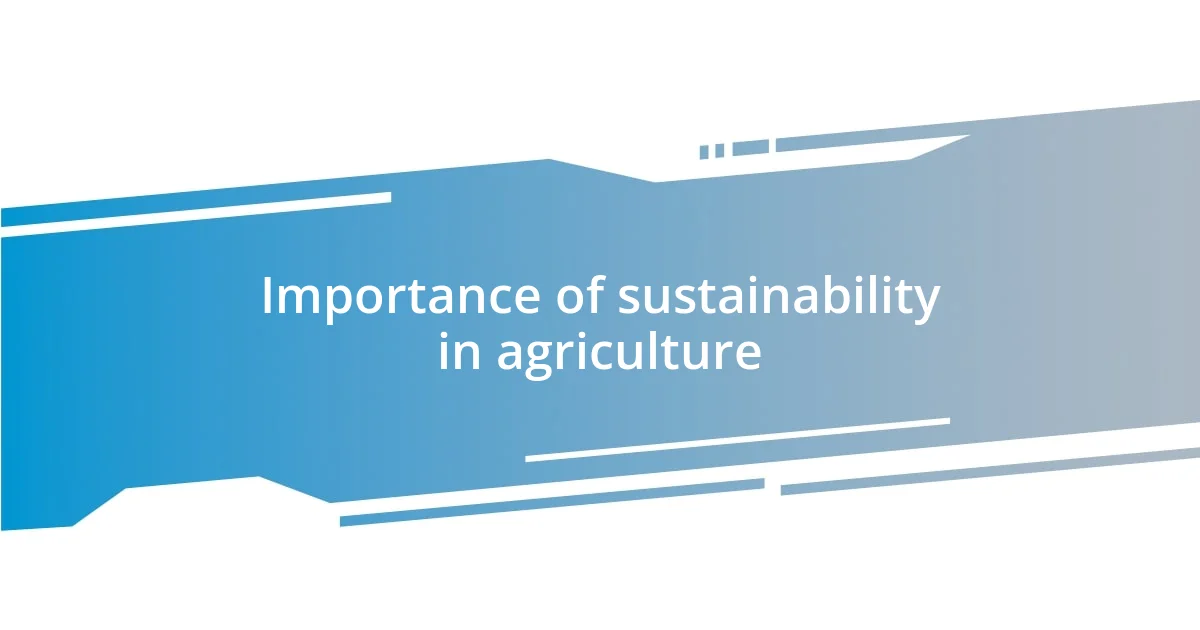
Importance of sustainability in agriculture
Sustainability in agriculture is crucial because it ensures we meet the food demands of current and future generations without compromising our planet. In my experience visiting various farms, I’ve noticed how sustainable methods not only boost productivity but also enhance soil health. It’s like nurturing a garden—you have to take care of the soil, and in return, it rewards you with rich harvests.
Another important aspect is the social responsibility that comes with sustainable practices. I remember chatting with a farmer who shared how his commitment to organic methods has fostered stronger community ties. By supporting local economies and creating jobs, sustainable farming practices trickle down to benefit everyone, including consumers looking for healthier food options. It truly illustrates the shared journey we’re on towards a more resilient food system.
Additionally, sustainable agriculture plays a pivotal role in combating climate change. I was struck by a recent discussion on carbon farming, where practices like agroforestry not only sequester carbon but also provide habitats for wildlife. Connecting these dots made me realize how powerful our agricultural choices can be. It’s not just about growing food; it’s about nurturing a planet that sustains us all.
| Aspect | Importance of Sustainability |
|---|---|
| Soil Health | Enhances nutrient retention, leading to better crop yields. |
| Social Responsibility | Supports local economies and creates jobs, building community resilience. |
| Climate Action | Contributes to mitigating climate change through carbon sequestration. |
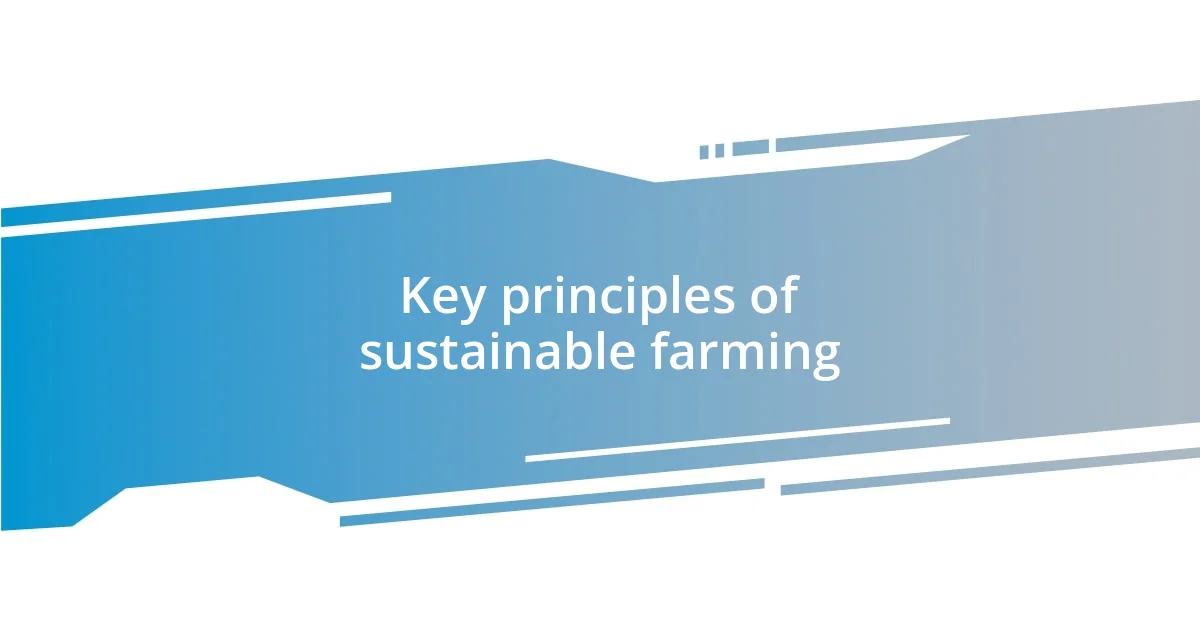
Key principles of sustainable farming
Sustainable farming is rooted in principles that nurture the balance between productivity and conservation. One of the essential aspects I’ve come to appreciate is the focus on integrated pest management (IPM). I remember helping my neighbor with her garden and using natural predators like ladybugs instead of pesticides. The thrill of watching those ladybugs munch away at aphids felt like a victory not just for her plants, but for the environment too.
Here are some key principles of sustainable farming to keep in mind:
- Crop Rotation: Alternating crops to maintain soil health and reduce pests.
- Conservation Tillage: Minimizing soil disturbance to support moisture retention and ecosystems.
- Agroecology: Utilizing ecological principles to foster resilience and biodiversity in farming practices.
- Water Management: Efficient use and recycling of water to minimize waste and nourish crops.
All these principles work together, and I’ve seen the difference they make not just on the farm, but in the wider environment. For example, while volunteering at a community garden, I noticed how implementing these practices led to richer soils and, ultimately, more flavorful produce. It’s clear to me that sustainable farming is not just a method, but a holistic approach to nurturing the earth while producing nourishing food for our communities.
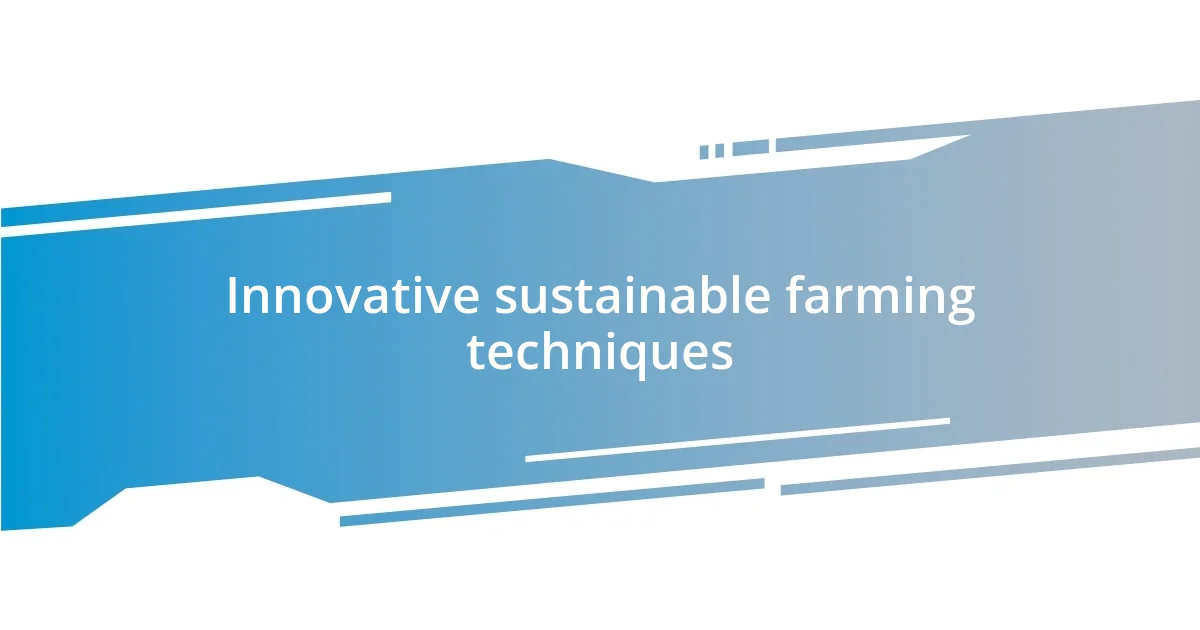
Innovative sustainable farming techniques
Exploring innovative sustainable farming techniques brings a wave of excitement and potential. One method I find fascinating is vertical farming, where crops are grown in stacked layers, often in controlled indoor environments. I remember a visit to an urban farm that utilized this technique, and I was amazed at how they maximized space while using 90% less water than traditional farming. Seeing vibrant greens and herbs thriving in a compact area truly brought home the idea that innovation can coexist with sustainability.
Another intriguing practice is the use of biochar, a type of charcoal made from organic material. It’s not just a soil amendment; it holds carbon and enhances soil fertility. During a field day on a friend’s farm, I witnessed the transformation in soil quality after incorporating biochar. The difference was palpable; the soil was richer and more aerated. It left me wondering—how many more innovative practices could we adopt for even greater impact?
Let’s not overlook the power of aquaponics, blending aquaculture with hydroponics to create a symbiotic environment. I once participated in a workshop where we built a small aquaponic system, and watching fish and plants thrive together was mesmerizing. This method not only produces food but also conserves water and reduces waste. Isn’t it incredible how nature can inspire solutions that align with our needs? These innovative approaches continuously reaffirm my belief that sustainable farming is a dynamic field with endless possibilities.

Effective water management strategies
Effective water management is crucial for sustainable farming, as it ensures crops receive the right amount of moisture without wasting precious resources. One method I’ve personally found beneficial is drip irrigation. I remember helping out at a local farm where we installed a drip system; it felt rewarding to see how each drop was delivered directly to the roots, minimizing evaporation loss. The farm seemed to thrive even during dry spells, and it made me appreciate the precision of this technique.
Another strategy that has piqued my interest is rainwater harvesting. I once visited a farm that had cleverly designed catchment systems to divert rainfall into storage tanks. Observing those tanks filled with rainwater, I thought about how they could use that collected water for irrigation during drier months, and it made me realize how intuitive and responsible this method is. Wouldn’t it be wonderful if more farms adopted this practice to alleviate the pressure on groundwater?
Additionally, I’ve noticed the impact of contour farming in my own gardening experience. The gentle curves and slopes in the land help slow down water runoff. I recall my initial attempts at planting on a slight slope; the way rainwater pooled softly rather than washing away reminded me of nature’s design. It’s an effective reminder that working with the land, rather than against it, can yield not just sustainability but also beauty in our farming practices.
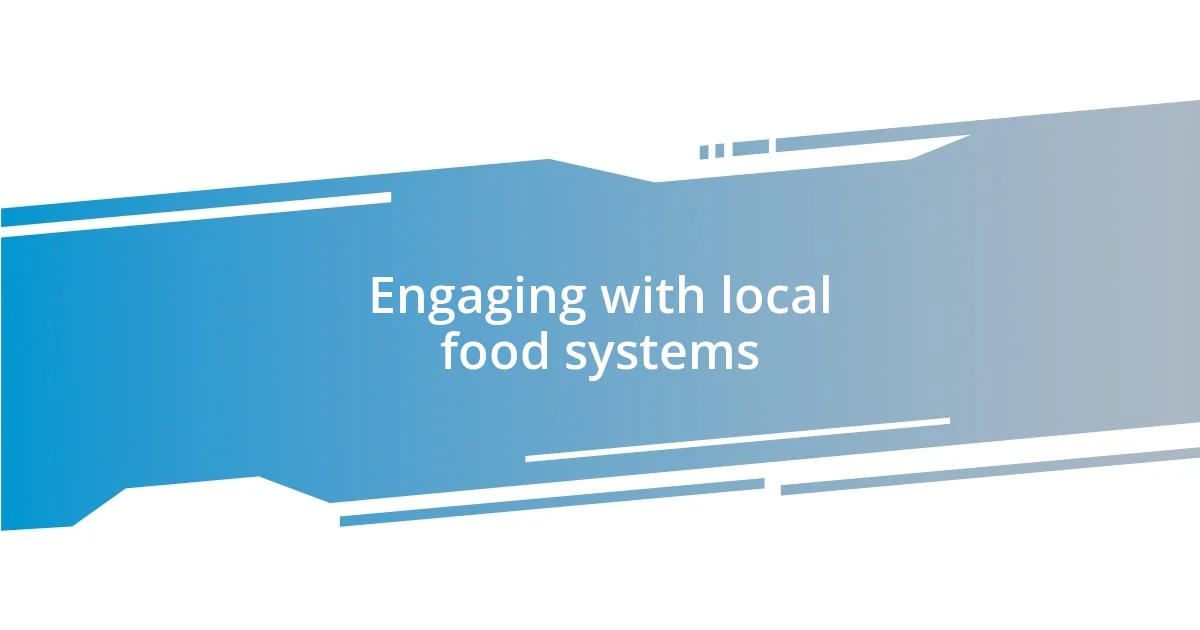
Engaging with local food systems
Engaging with local food systems is essential for fostering community connections and promoting sustainability. I remember the first time I attended a farmer’s market in my neighborhood—it was vibrant with fresh produce and local artisans. Interacting with the farmers directly made me realize the hard work and passion that goes into each harvest. It felt good to support those who are contributing to a sustainable food environment right in my own backyard.
Participating in local food cooperatives has been a game changer for me. I still recall joining a community-supported agriculture (CSA) program, where I received a box of seasonal vegetables each week. The excitement of opening those boxes, filled with the freshest produce, opened my eyes to the benefits of eating locally. The taste was incomparable, and I found myself experimenting with new recipes, enriching my diet while supporting local growers. Isn’t it fascinating how engaging with the local food system can transform our eating habits and foster relationships within the community?
Another experience that stands out is volunteering at a local community garden. Initially, I joined to learn more about sustainable practices, but I ended up forging friendships and gaining a deeper appreciation for the food we grow. Sharing stories and growing together brought a sense of belonging that I’d never anticipated. It made me wonder—how can we all contribute to building stronger local food systems? The answer lies in our willingness to connect and engage, fostering a sense of stewardship in our communities.












